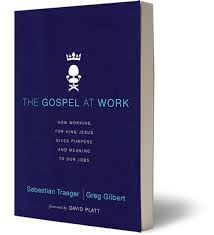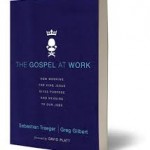 One of the constant struggles I had when I was still working as a school teacher was how to be conscious of God throughout my day.My time was filled with the pressure of giving good lessons, keeping students on task, and correcting poor behavior, not to mention the possible visit in the classroom by an administrator. How could I think about godliness, praying (without ceasing yet!), or praising God with all that stuff on my mind?
One of the constant struggles I had when I was still working as a school teacher was how to be conscious of God throughout my day.My time was filled with the pressure of giving good lessons, keeping students on task, and correcting poor behavior, not to mention the possible visit in the classroom by an administrator. How could I think about godliness, praying (without ceasing yet!), or praising God with all that stuff on my mind?
I wish I had this book available to me then because it answers these questions. Our book of the month is The Gospel At Work, written by Sebastian Traeger, a businessman, and Greg Gilbert, a pastor. The big idea of the book, stated in the introduction, is this: “No matter what you do, your job has inherent purpose and meaning because you are doing it ultimately for the King.”
While this purpose is repeated throughout the book, one chapter titled “How to Balance Work, Church, and Family” discusses many of the responsibilities that we attempt to juggle and which create tension as we go. It is pointed out that our number one primary job is spelled out in scripture: our calling to follow Jesus. All of those other responsibilities are subordinate to it. While that may be an oversimplification, the book gives some good ideas on how to make that work and provides a good perspective that we will do well to adopt into the life we live each day.
The book begins by contrasting two different problems that people have with their job. One is idolatry, where our job becomes our passion; everything else is pushed aside as secondary. The other problem is idleness, where we feel that our job is meaningless and we don’t care much about it. We become unproductive in our work because we are not giving it our best effort. The authors do an excellent job of showing how the gospel addresses both of these extremes. There are some helpful diagnostic questions to determine which end of the spectrum you tend to go. And it’s possible that you will even fluctuate between them, sometimes treating your job as an idol but other times being idle.
The last several chapters are very practical. For example, there are a series of questions you can ask as you look for a job or perhaps even consider a change in employment. Your job hunt begins at the bottom of a helpful pyramid illustration with the glory of God, rather than the typical approach of looking for something that fits your life, which is at the top of the pyramid. In the middle you find the interests of others, which would ask this question: “Does this job provide for my needs and allow me to be a blessing to others?” Did you know there is a verse in the Bible that actually addresses that topic? It’s Ephesians 4:28. It begins with an admonition against stealing, but goes on to say that the Christian is to do what is good “so that he will have something to share with the one who has need.” Where is that in your priorities as you look for your job?
Other chapters are also helpful, providing information on working with bosses and coworkers as well as being a boss yourself. Keeping in mind the main thesis of the book (working for King Jesus), these chapters will help you evaluate your own job performance from God’s perspective. In fact, each chapter ends with helpful questions that you can use individually or with others to help you see how you are doing at taking the gospel to work with you each day.
I suggest you work through this book and begin applying the challenging principles offered. You should see a change for the good on how you view the “daily grind” we call employment. I even see how I can use it in my retirement years because, ultimately, we all have the same job with the same boss: being a follower of King Jesus 24/7 (as they say). It’s time to get that right!

